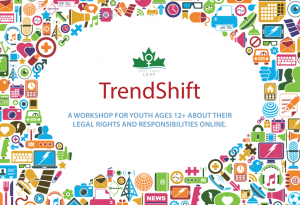Legal Resources for Youth
Do you work with children and youth? Here are some interesting services and programs from our Clicklaw contributors that you may not know about:
Bookable Court Tours, Mock Trials & School Workshops
 Justice Education Society runs a Justice Education Program that provides bookable court tours in various locations across BC and also facilitates youth mock trials: JES helps coordinate about 70 youth mock trials each year, performed by youth ranging from Grade 5 to Law 12 students. Younger participants will use scenarios from popular book series (e.g. Harry Potter), while Law 12 students will perform actual case re-enactments. To read more about how to book a court tour or mock trial, click here.
Justice Education Society runs a Justice Education Program that provides bookable court tours in various locations across BC and also facilitates youth mock trials: JES helps coordinate about 70 youth mock trials each year, performed by youth ranging from Grade 5 to Law 12 students. Younger participants will use scenarios from popular book series (e.g. Harry Potter), while Law 12 students will perform actual case re-enactments. To read more about how to book a court tour or mock trial, click here.
 The Downtown Community Court (DCC) in Vancouver’s DTES, which opened in 2008, is a partnership between the BC Provincial Court, the Ministry of Justice, and social and health service agencies. Its goal is to reduce crime, improve public safety, and provide integrated justice, health and social services to offenders in a timely manner, while holding them accountable for their actions. DCC offers tours to the general public, school groups and even international visitors, who come to learn about the DCC model. The tour lasts for about 1.5 hours during which the guide will introduce: how the DCC got started, who generally attends at the DCC, a typical day in court, and what integrated programs are connected with the court. Tours are provided on Tuesday and Thursday or by special arrangement. To organize a tour, contact communitycourt@gov.bc.ca.
The Downtown Community Court (DCC) in Vancouver’s DTES, which opened in 2008, is a partnership between the BC Provincial Court, the Ministry of Justice, and social and health service agencies. Its goal is to reduce crime, improve public safety, and provide integrated justice, health and social services to offenders in a timely manner, while holding them accountable for their actions. DCC offers tours to the general public, school groups and even international visitors, who come to learn about the DCC model. The tour lasts for about 1.5 hours during which the guide will introduce: how the DCC got started, who generally attends at the DCC, a typical day in court, and what integrated programs are connected with the court. Tours are provided on Tuesday and Thursday or by special arrangement. To organize a tour, contact communitycourt@gov.bc.ca.
People’s Law School runs the Justice Theatre program, delivered throughout the province of BC: a troupe of professional actors perform dramatizations of criminal trials at elementary and secondary schools and to community groups. Each show is designed for participatory engagement. Attendees are encouraged to be part of the jury, to debate the issues and to vote on the overall outcome of the case. Topics can range from: Bullying and the Internet, Bullying and Violence, Stanley Cup Riot, Gang Violence, and Shoplifting. For more information on Justice Theatre, please contact: Rob McAninch 604-331-5400
 West Coast LEAF offers workshops for students in Grades 8-12, in Kamloops, Nanaimo and the Lower Mainland. The workshops can be delivered in schools or community groups. The goals of the workshops are to: open a space for discussion with young people about the ways the Internet is used in our lives, and to clear up myths about what the law in BC says about online behaviour. The workshop is 2.5 hours in length and can be offered over 1-3 sessions. Read more about the TrendShift workshops here.
West Coast LEAF offers workshops for students in Grades 8-12, in Kamloops, Nanaimo and the Lower Mainland. The workshops can be delivered in schools or community groups. The goals of the workshops are to: open a space for discussion with young people about the ways the Internet is used in our lives, and to clear up myths about what the law in BC says about online behaviour. The workshop is 2.5 hours in length and can be offered over 1-3 sessions. Read more about the TrendShift workshops here.
 Cerebral Palsy Association of BC operates a number of programs for youth with disabilities, including: a Youth Without Limits Support Group – a peer-to-peer support group for people with disabilities – youth and young adults between the ages of 13-29, facilitated by people with disabilities. Youth Without Limits is held in downtown Vancouver. The Cerebral Palsy Association of BC also operates the Navigator for Youth Transitioning to Adult Services, which helps connect youth with the services they need through our specialized information and referral resource. The Navigator service is available for youth aged 14 to 25, their parents and members of their Transition Support Teams. To access this service, call the CPABC office at 604-408-9484, or email Jeanne@bccerebralpalsy.com.
Cerebral Palsy Association of BC operates a number of programs for youth with disabilities, including: a Youth Without Limits Support Group – a peer-to-peer support group for people with disabilities – youth and young adults between the ages of 13-29, facilitated by people with disabilities. Youth Without Limits is held in downtown Vancouver. The Cerebral Palsy Association of BC also operates the Navigator for Youth Transitioning to Adult Services, which helps connect youth with the services they need through our specialized information and referral resource. The Navigator service is available for youth aged 14 to 25, their parents and members of their Transition Support Teams. To access this service, call the CPABC office at 604-408-9484, or email Jeanne@bccerebralpalsy.com.
Online Resources
- Explore the “Children & teens” section of the Clicklaw site to find common questions and resources on: young people and criminal law, parental separation, rights of children & teens, and protecting children.
- The HelpMap features multiple services that provide help with legal issues related to children & teens here.
- The Law Foundation of BC and the Representative for Children and Youth have compiled a list of resources and services for children and youth; many of these resources can also be accessed through Clicklaw.
- Justice Education Society has just soft-launched a new service for youth

at LegalRightsForYouth.ca. What’s new: a virtual assistant to help youth understand basic legal concepts and find the right information. Every weekday from 11am to 2pm, youth can chat live (with LSLAP students) to get answers to their legal questions. During offline hours, youth can ask questions and get answers back by email. Topics include: Working, Renting, Driving, Debt, etc.



